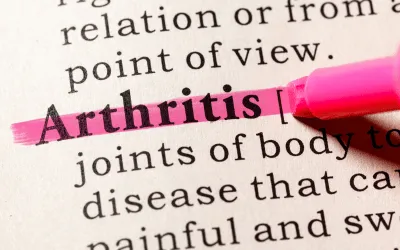About Arthritis
As the nation’s #1 cause of disability, arthritis affects nearly 60 million adults and 300,000 children. Over 100 types of arthritis and related conditions damage the joints and often other organs.
How can we assist you?
Helpful Tools for You

How Integrative Medicine Combines Mind-Body Techniques and Nutritional Interventions for Better Health
When Mind, Body, and Nutrition Work Together
Imagine walking into your doctor's office and instead of just getting a prescription, you receive a comprehensive plan that includes meditation techniques, nutritional guidance, and lifestyle changes designed specifically for you. This isn't wishful thinking – it's integrative medicine, and it's transforming how we approach health and healing.
Here's what's remarkable: Recent studies show that integrative medicine approaches combining mind-body techniques with nutritional interventions can reduce heart disease risk by 30%, lower the risk of early death by up to 80%, and significantly improve cognitive function as we age.
If you've ever felt like traditional medicine treats your symptoms but not the whole you, this guide will show you how integrative medicine is creating a new paradigm of care that treats your mind, body, and spirit as one connected system.
What Is Integrative Medicine, Really?
Think of integrative medicine as the best of both worlds. It takes the proven, scientific foundation of conventional medicine and combines it with evidence-based complementary therapies to treat the whole person – not just the disease.
The BERN Framework: Your Four Pillars of Health
Recent research has identified four core principles that make integrative medicine so effective, known as the BERN framework:
B - Behavior (Including social support and resilience factors) E - Exercise (Physical activity tailored to your needs) R - Relaxation (Mind-body practices and stress management) N - Nutrition (Food as medicine for your specific needs)
What makes this different? Unlike traditional medicine that often focuses on treating illness, integrative medicine emphasizes your body's natural ability to heal and stay healthy.
Mind-Body Medicine: The Science of Self-Healing
Your Brain-Body Connection
For decades, we treated the mind and body as separate entities. Now we know they're intimately connected. Mind-body practices target brain-body interactions as a way to promote health, and the results are remarkable.
Recent 2024 research shows:
Meditation techniques are effective in treating post-traumatic stress disorder
Yoga significantly improves balance and reduces fall risk in older adults
Tai chi enhances immune response and provides sustained cognitive benefits
Mindfulness-based stress reduction helps manage chronic pain and inflammation
The Most Effective Mind-Body Techniques
1. Meditation and Mindfulness
What it does: Helps you observe thoughts and emotions without becoming overwhelmed
Health benefits: Reduces stress hormones, lowers blood pressure, improves immune function
How to start: Begin with just 5-10 minutes daily using guided apps or simple breathing exercises
2. Yoga
What it does: Combines specific postures with breathing to unify mind and body
Health benefits: Reduces pain, enhances immune response, improves posture and muscle strength
Getting started: Chair yoga is perfect for beginners or those with mobility concerns
3. Tai Chi and Qigong
What it does: Gentle movements that integrate body movement, muscle relaxation, and breathing
Health benefits: Improves balance, reduces fall risk, enhances mental clarity
Perfect for: Older adults or anyone wanting low-impact exercise
4. Biofeedback
What it does: Uses sensors to help you learn to control physiological responses like heart rate and muscle tension
Health benefits: Manages chronic pain, reduces anxiety, improves sleep
The science: You learn to influence your body's automatic processes consciously
Nutritional Interventions: Food as Your Medicine
The Mediterranean-MIND Diet Connection
One of the most exciting developments in integrative medicine is the recognition that certain dietary patterns can literally change your brain and body at the cellular level.
The MIND Diet Revolution The Mediterranean-DASH Intervention for Neurodegenerative Delay (MIND) diet combines the best of Mediterranean and DASH diets, specifically designed to protect your brain as you age.
2024 Clinical Results:
Higher MIND diet adherence was protective against dementia in 7 of 10 major studies
Reduced heart disease risk by 28-30% in large clinical trials
Slowed cognitive decline and improved memory function
Decreased inflammation throughout the body
Foods That Heal: Your Daily Medicine Cabinet
Brain-Protective Foods:
Leafy greens: Spinach, kale, collards (aim for 6+ servings per week)
Berries: Blueberries, strawberries (2+ servings per week)
Nuts: Especially walnuts and almonds (5+ servings per week)
Fish: Salmon, sardines, mackerel (1+ serving per week)
Olive oil: Use as your primary cooking fat
Heart-Healthy Foods:
Whole grains: Brown rice, quinoa, oats
Legumes: Beans, lentils, chickpeas
Vegetables: Aim for at least 3 servings daily
Poultry: Instead of red meat (2+ servings per week)
Foods to Limit:
Red meat (less than 4 servings per week)
Butter and margarine (less than 1 tablespoon daily)
Cheese (less than 1 serving per week)
Pastries and sweets (less than 5 servings per week)
Fried or fast food (less than 1 serving per week)
The Gut-Brain Connection
Recent research reveals that your digestive system is like a "second brain" that directly communicates with your mind and influences your mood, memory, and overall health.
How nutrition affects your mind:
Clinical evidence shows the Mediterranean diet and omega-3 fatty acids can significantly improve symptoms of depression
Certain nutrients can reduce anxiety and improve cognitive function
A healthy gut microbiome supports better mental health and immune function
Real-World Applications: Putting It All Together
Morning Routine for Integrative Health
Upon Waking (5-10 minutes):
Start with 5 minutes of deep breathing or meditation
Set a positive intention for the day
Do gentle stretches or yoga poses
Breakfast:
Green tea or coffee with antioxidant-rich foods
Oatmeal with berries and nuts
Or eggs with leafy greens and whole grain toast
Throughout the Day
Stress Management:
Take "mindful moments" – 3 deep breaths before meals
Practice gratitude by noting 3 positive things
Use progressive muscle relaxation during breaks
Movement:
Take walking meetings when possible
Use stairs instead of elevators
Try desk exercises or stretches every hour
Evening Wind-Down
Dinner:
Focus on vegetables, lean protein, and whole grains
Practice mindful eating – chew slowly and appreciate flavors
Avoid screens during meals
Before Bed:
Gentle yoga or stretching
Meditation or journaling
Create a calm environment for quality sleep
Conditions That Respond Well to Integrative Medicine
Chronic Pain Management
The Approach:
Mind-body techniques for pain perception
Anti-inflammatory nutrition
Gentle movement and exercise
Stress reduction strategies
Success Rates: Studies show 60-80% improvement in pain management when combining these approaches.
Heart Disease Prevention
The Strategy:
Mediterranean-style eating
Stress management through meditation
Regular physical activity
Social support and community
Results: Up to 30% reduction in heart disease risk and 80% reduction in early death when combined with healthy lifestyle factors.
Cognitive Health and Memory
The Protocol:
MIND diet nutrition
Regular meditation practice
Physical exercise
Social engagement and learning
Outcomes: Significant slowing of cognitive decline and improved memory function in clinical trials.
Diabetes Management
The Framework:
Blood sugar-stabilizing nutrition
Stress reduction (stress raises blood sugar)
Regular movement and exercise
Mindful eating practices
Benefits: Better blood sugar control, reduced medication needs, and improved quality of life.
Getting Started: Your Practical Action Plan
Week 1: Assessment and Foundation
Day 1-2: Evaluate Your Current State
Rate your stress level (1-10)
Track your current eating patterns
Note your energy levels throughout the day
Assess your sleep quality
Day 3-4: Begin Simple Practices
Start with 5 minutes of deep breathing daily
Add one serving of leafy greens to your diet
Take a 10-minute walk after meals
Day 5-7: Establish Routines
Create a consistent wake-up time
Plan healthy meals and snacks
Set aside time for relaxation before bed
Week 2-4: Building Your Practice
Mind-Body Techniques:
Increase meditation to 10-15 minutes
Try a beginner yoga class or online video
Practice mindful eating during one meal daily
Nutritional Changes:
Gradually adopt Mediterranean-style eating
Reduce processed foods by 50%
Add nuts, berries, and fish to your weekly routine
Lifestyle Integration:
Find enjoyable forms of movement
Create stress-reduction strategies for difficult days
Build social connections around healthy activities
Month 2 and Beyond: Advanced Integration
Deepening Your Practice:
Explore different types of meditation
Join community classes for yoga or tai chi
Work with a nutritionist or integrative medicine practitioner
Personalizing Your Approach:
Identify which techniques work best for you
Adjust nutrition based on your health goals
Create sustainable long-term habits
Working with Healthcare Providers
Building Your Integrative Health Team
Core Team Members:
Primary care physician (your health quarterback)
Integrative medicine physician (for comprehensive care planning)
Nutritionist or dietitian (for personalized nutrition guidance)
Mental health counselor (for stress management and emotional support)
Complementary Practitioners:
Yoga or tai chi instructor
Massage therapist
Acupuncturist
Mindfulness teacher
Questions to Ask Your Healthcare Team
"How can mind-body techniques help with my specific condition?"
"What nutritional changes would benefit me most?"
"Are there any interactions between supplements and my medications?"
"How do we measure progress with integrative approaches?"
"What's the evidence for these treatments in my situation?"
The Science Behind the Success
What Research Shows
Neuroplasticity: Your brain can literally rewire itself through meditation and mindfulness practices, creating new neural pathways for better health.
Epigenetics: Nutrition and lifestyle choices can influence which genes are "turned on" or "turned off," affecting your health at the cellular level.
Psychoneuroimmunology: The study of how psychological factors influence your nervous system and immune function, explaining why stress management is so crucial for health.
Microbiome Research: Your gut bacteria influence everything from mood to immune function, and diet directly shapes this internal ecosystem.
Why the Combination Works
Synergistic Effects: When you combine mind-body practices with nutritional interventions, they amplify each other's benefits. Meditation reduces stress hormones that interfere with digestion, while good nutrition provides the building blocks for neurotransmitters that support calm and focus.
Holistic Healing: Instead of treating symptoms in isolation, integrative medicine addresses root causes and supports your body's natural healing mechanisms.
Overcoming Common Obstacles
"I Don't Have Time"
Reality Check: You don't need hours. Even 5-10 minutes of daily practice can make a significant difference.
Solutions:
Combine activities (mindful eating, walking meditation)
Use transition times (breathing exercises between activities)
Start with one small change and build gradually
"It Seems Too Complicated"
Truth: Start simple. You don't need to master everything at once.
Approach:
Pick one mind-body technique and one nutritional change
Use apps and online resources for guidance
Join community classes for support and learning
"I'm Not Sure It Will Work"
Evidence: The research is clear – these approaches work when practiced consistently.
Strategy:
Give yourself at least 8-12 weeks to see results
Track your progress with simple measurements
Work with qualified practitioners for guidance
The Future of Integrative Medicine
Emerging Trends
Personalized Nutrition: Using genetic testing and microbiome analysis to create truly individualized nutrition plans.
Digital Health Integration: Apps and devices that track stress, sleep, and nutrition to provide real-time feedback.
Community-Based Programs: Healthcare systems creating group classes and community support for integrative health practices.
Precision Medicine: Combining genetic, lifestyle, and environmental factors to create highly personalized treatment plans.
Healthcare System Changes
More hospitals and clinics are establishing integrative medicine centers that offer:
Nutritional counseling as part of medical treatment
Mind-body medicine classes
Group medical visits focused on lifestyle medicine
Integration of conventional and complementary therapies
Your Next Steps: Making It Personal
Today:
Take 5 deep breaths and notice how you feel
Add one colorful vegetable to your next meal
Set a intention to prioritize your health
This Week:
Schedule time for daily stress reduction practice
Plan meals that include brain-healthy foods
Connect with others who share your health goals
This Month:
Consider consulting with an integrative medicine practitioner
Establish consistent daily routines for mind-body practices
Track your progress and celebrate small improvements
Long-term:
Build a sustainable lifestyle that supports whole-person health
Become an advocate for integrative approaches in your community
Continue learning and adapting your practices as you grow
The Bottom Line: Your Health, Your Choice
Integrative medicine isn't about rejecting conventional healthcare – it's about expanding your options and taking an active role in your health and healing. By combining the best of modern medicine with proven mind-body techniques and nutritional wisdom, you're not just treating disease – you're cultivating wellness.
Remember these key truths:
Your mind and body are intimately connected
Food is medicine when chosen wisely
Small, consistent practices create big changes over time
You have more control over your health than you might think
Healing happens when you treat the whole person, not just symptoms
The Most Important Thing
Integrative medicine works because it recognizes something profound: you are not just a collection of symptoms to be treated, but a whole person with the innate capacity for healing and wellness. When you align your mind, body, and nutrition in support of health, remarkable things become possible.
Your journey to better health doesn't have to be complicated. It starts with simple choices: a few minutes of quiet breathing, adding more vegetables to your plate, taking a walk in nature, or practicing gratitude. These small acts of self-care, when practiced consistently, can transform your health and your life.
The question isn't whether integrative medicine works – the research proves it does. The question is: are you ready to take an active role in your own healing and discover what's possible when you treat your whole self with care and respect?

Effects of Arthritis

Cause of Disability
In the United States, 23% of all adults, or more than 54 million people, have arthritis. It is a leading cause of work disability, with annual costs for medical care and lost earnings of $303.5 billion.

Workforce Effects
Sixty percent of US adults with arthritis are of working age (18 to 64 years). Arthritis can limit the type of work they are able to do or keep them from working at all.

Global Impact
In fact, 8 million working-age adults report that their ability to work is limited because of their arthritis. For example, they may have a hard time climbing stairs or walking from a parking deck to their workplace.
Promoting Interventions That Reduce Arthritis Pain
American Arthritis Foundation recognizes several proven approaches to reduce arthritis symptoms:
Be active. Physical activity—such as walking, bicycling, and swimming—decreases arthritis pain and improves function, mood, and quality of life. Adults with arthritis should move more and sit less throughout the day. Getting at least 150 minutes of moderate-intensity physical activity each week is recommended.
Protect your joints. People can help prevent osteoarthritis by avoiding activities that are more likely to cause joint injuries.
Talk with a doctor. Recommendations from health care providers can motivate people to be physically active and join a self-management education program. Should your arthritis be interfering with your activities of daily living you may be a candidate to receive many new treatments, and learn how to reverse the arthritis condition.
Have a question?
We're Here to Help
By providing my phone number, I agree to receive text messages from the business.


